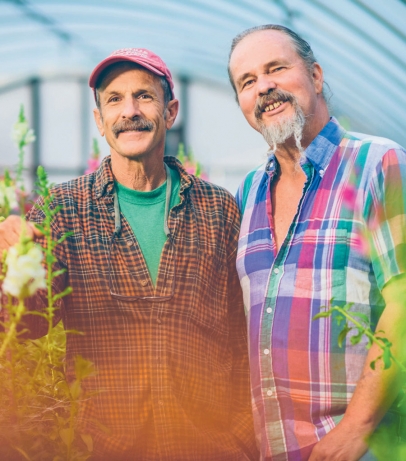An Interview with Mark Cain of Dripping Springs Garden
How would you describe your farm?
We are a 4-acre, certified organic, mixed vegetable, flower, and herb farm located in south Carroll County at the end of a dead-end road, surrounded by beautiful Ozark forests. We are located right on Dry Fork Creek, which flows into the Kings River.
My farm partner is Michael Crane. He is co-owner and co-manager. We have five interns.
What farmers markets do you sell at?
We are at the Fayetteville Farmers’ Market. We have been there since 1984. I think we are the second-longest members there, after Vivian London.
Do you direct-source to restaurants?
We are selling to The Farmer’s Table, Ozark Natural Foods, and to our CSA (Community Supported Agriculture) subscribers, and occasionally to Greenhouse Grille and Blackboard Grocery.
Has demand increased with more farm-to-table emphasis in the region?
Especially in the last five years, there has been a real change in the customer base in the farmers market, where we are seeing more and more people in their 20s to 40s coming. It has become hip to be aware of what is grown and made locally. I still think that there is a lot of work for farmers and advocates to do about how to cook what’s in season. So, we are thankful for things like Edible Ozarkansas to help that process.
Ozark Natural Foods (ONF) has been instrumental in helping those of us who grow on any scale that are organic to find a market. They made a decision some years ago that they really wanted to start cultivating the local farmer base they had access to, and providing a market. They’ve really bent over backwards to try to buy from us. It has become a really great secondary outlet for us. The farmers market was always our prime outlet, because we like the direct contact. But our farm kept growing, and we definitely needed some wholesale outlets, too. It’s still not a way to get rich, but those types of accounts like we have at ONF and the Farmers Table and our CSA are very helpful because most people cannot sell everything they grow through the farmers market.
How do you approach in sect control?
We have two plans of action. Number one is “wait and see.” Number two is “scout.” Scouting is early detection of problems.
We also have a “no warfare” approach, meaning that we know we are all in this together - everybody has got to eat. That includes blister beetles and armadillos. But we are also territorial. If something has to eat, good. But we are going to be territorial about products that are critical for our livelihood or our table. We try not to turn it into a war. It’s just a matter of pushing something back until the damage is at acceptable levels.
Do you end up with much excess produce?
We try not to. In our planning process, we base our plans on what was planted the previous year and tweak that to eliminate as much excess as possible. Because we’re feeding seven people here, six to seven days a week, we also do a lot of canning and freezing. We try to eat it or give it away to neighbors, but we mostly try not to have a lot of it. We keep a record of everything that sells at market. If we knew we sold 40 bunches last week, and it was a really busy day, there is no reason to think we can sell 60 bunches this week.
Record keeping is really important. People who think you can just go throw a bunch of stuff in the ground and take it to market and sell it without any training or experience are just running a fantasy, because doing anything well takes a lot of practice.
What’s your definition of “bad GMO”?
Certified organic growers are not allowed to use any GMO products, as part of the National Organic standards that were passed in 2002. The main reason I am not interested in GMOs is because the plant then becomes proprietary property of the company that developed it. It does not lead to a democratization of distribution of plant material. I don’t think Monsanto and the other companies who produce GMOs need to own the food supply.
What is your response to consumers who want cheaper products?
It’s hard for me to realize how little somebody actually knows about what goes into the production of a quart of strawberries. When I see that quart of strawberries, I think about how many nights we went out there late in the afternoon and covered everything up so it wouldn’t get frost bitten. I think about the several hundred dollars that we spent on the plants, the making of the beds, all the people we had to hire to plant them. I also consider the maintenance of that whole crop, what it took to go out and get them picked, and then grade them, and get them to market, and sell them.
And the customer doesn’t know any of it. What they have to compare it to is what they just saw at Walmart or Harps, which came from a completely different stream, outside the area, using underpaid labor, with industrial processes. They are not comparing the same things. We just try to be as polite as possible and remember all that as we are responding.
Where do you see your farm in 10 or 50 years?
I feel like recently our farm has come into maturity in the same way that it takes a really long time for an oak tree to grow until the point where it can be relied upon to be resilient, to weather storms and be mostly productive, and to be big enough to have safe space for little critters that live in it. I feel we are kind of getting to that place, where it feels like the management and the production are stable. It feels solid, and it feels beautiful, and it feels like there are customers out there who know who we are and appreciate us for who we are, and that’s awesome. I think that process of maturity will still be happening in 10 years, even though in 10 years I will be 72. But we have these younger people coming on board who are a farming part of our staff here, and I think that it is transitioning. It’s nice having the younger hands and the older wisdom together. It continues to be a good thing for a while.
In 50 years, that’s harder to predict. It’s possible that there will still be a producing farm here. The place where we are is a really special, kind of magical spot. I don’t think that will ever really change, as long as the lineage of people that hold onto the title are appreciative. I think it attracts a kind of person in the same way that the Ozarks attract a certain kind of person through their natural beauty. It’s like a siren call to those people who can hear it. Our place is kind of like that, too. I’m going to trust that will continue to happen.
Why do you stay in farming when it is considered a hard way of life?
Because it is very rewarding.
I think there are some people that have to do it. I think I’m probably one of those people. For one thing, the farm is independent, financially. That is a very big deal. I can’t say that was the main draw for me. I think I discovered that I liked working outside as much as possible. I like being in the elements and watching things grow. So, that’s probably where it started - just the actual, physical handling of plants.
Gardening as an art form came from my early training with Alan Chadwick. He was an artist and horticulturalist, and so the gardens were always beautiful and this makes a tremendous difference psychologically in the work itself. When it is very diverse, and it’s a beautiful place to be, it is a concept called Home in the Garden. This is a very old archetype, harping back to the Garden of Eden type thing.
It’s a type of magic. To be involved in that is very special. It’s an opportunity that a lot of people don’t get to have. And we were very lucky when we found this piece of land that was affordable, that we’ve enjoyed for such a long time. We are really grateful to be here.
When do you feel most appreciated?
Some people just get it - what we’re doing, what we are enjoying. Actually, I think our customers see us having a good time at the market. They see that we really enjoy what we do, and I think that is why we are successful there. It’s not just about selling a lot of product and making money. It’s a whole life. When they see us at market, and they see what we have there represents the tip of the iceberg for our whole life lived with those things, then I feel like people can actually see who we are.
From what/where do you draw inspiration?
The writings of Wendell Berry, and of Masanobu Fukuoka, from fog sitting on top of the garden on a cold morning, from the happiness I see young people start to exude after they have been working here for a while.
What’s the best part of being on your farm?
The realization of how rare it is, and that it’s kind of a miracle. And the feeling of being lucky to be here.





